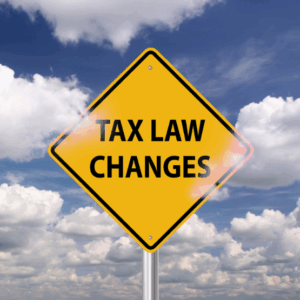A new tax bill—officially called the “One Big Beautiful Bill Act” (OBBBA)—was recently signed into law, and we wanted to share a quick overview of what it may mean for you.
While the bill is large in scope, we don’t expect it to significantly change most clients’ tax situations. That said, there are a few updates worth noting, especially for individuals, families, and business owners.
Key Tax Changes That May Affect You
1. 2017 Tax Cuts Made Permanent
The individual tax rates from the 2017 Tax Cuts and Jobs Act (TCJA) are now permanent. This means the current seven tax brackets and the increased standard deduction will remain in place, helping many households avoid a tax increase in 2026.
2. Expanded Deductions
- SALT Deduction Increase (2025 – 2029): The cap on state and local tax (SALT) deductions will rise from $10,000 to $40,000 starting in 2025, with 1% increases through 2029. This change primarily benefits residents in states with high property and income taxes and is subject to phase out for certain individuals.
3. New Deductions
- Senior Deduction* (2025-2028): Seniors 65+ earning up to $75,000 ($150,000 for couples) can claim a $6,000 deduction. This enhanced deduction is on top of the existing deduction for tax filers over the age of 65 ($2,000 for single filers and $1,600 per spouse for joint filers).
- Charitable Deductions for Taxpayers Not Itemizing (starts in 2026): $1,000 deduction for single tax filers and $2,000 deduction for married tax filers.
- Auto Loan Interest (2025–2028): Deduct up to $10,000 in interest on new U.S.-assembled car purchases, subject to income limits.
- Tips and Overtime (2025-2028): Workers can deduct up to $25,000 in reported tips and $12,500 in overtime pay, subject to income limits.
*Note: This is a new deduction for seniors—it does not mean Social Security income is no longer taxed.
4. Estate and Gift Tax (starts in 2026)
The lifetime exemption for the federal estate and gift taxes has been permanently increased to $15 million for single filers and $30 million for joint filers, offering more flexibility in legacy and estate planning.
5. Clean Energy and EV Credits Rolled Back
Several clean energy tax credits are being phased out or eliminated. Notably, the $7,500 credit for new electric vehicles and the $4,000 credit for used EVs will end after September 2025.
6. Expansion of 529 accounts to cover post-secondary professional certifications
Support for Businesses and Investors
If you’re a business owner or investor, the bill includes several provisions that may benefit you:
- 100% expensing of domestic research and experimental (R&E) Cost after 12/31/2024
- Interest deductions are now based on EBITDA (earnings before interest, taxes, depreciation, and amortization), which allows for greater deductibility.
- Continued support for domestic manufacturing and innovation.
Further Considerations
- “Trump Accounts”: New tax-deferred savings accounts for children with rules similar to an IRA. Annual $5,000 per year contribution limit. One-time initial credit from the federal government for individual born from 12/31/2024 and before 01/01/2029
- Charitable Giving: A new minimum floor for charitable deductions—0.5% of income for individuals who itemize.
- Healthcare: Medicaid eligibility checks will become more frequent, and funding for rural hospitals has been increased.
Looking Ahead
While many of these changes are beneficial, some are temporary and could be revised in the future. We don’t expect this bill to dramatically change your tax picture—but we’re happy to take a closer look.
If you’d like a personalized analysis, we can review your situation using our tax planning software, Holistiplan. Just let us know, and we’ll schedule a time to walk through it together.
For those interested in reading the full text of the legislation, you can access it here: https://www.congress.gov/bill/119th-congress/house-bill/1/text.
_____________________
The opinions voiced in this material are for general information only and not intended to provide specific advice or recommendations for any individual or entity. This information is not intended to be a substitute for specific individualized tax or legal advice. We suggest that you discuss your specific situation with a qualified tax or legal advisor.
Securities and advisory services offered through LPL financial, a registered investment advisor, Member FINRA/SIPC.
Cornerstone Wealth Strategies is not registered as a broker-dealer or investment advisor.












